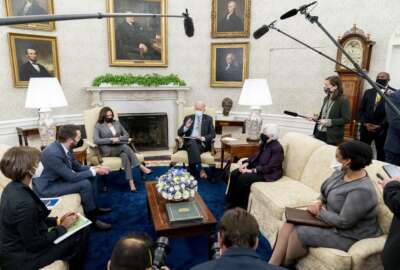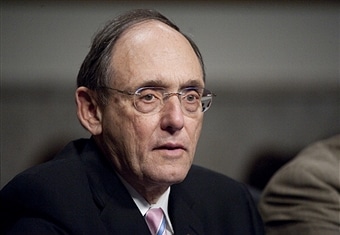
Another year, another record-high budget request for VA
The Department of Veterans Affairs has experienced several consecutive years of budget boosts, and 2022 may be no different. But unlike prior years, VA is seeking...
The pandemic has prompted the Department of Veterans Affairs to pivot and take on new missions, but in many ways, the conversations surrounding the agency’s budget haven’t changed all that much.
VA has experienced several consecutive years of budget increases, and if the Biden administration gets its way, 2022 would be no different.
The department has asked for $113.1 billion in discretionary funding next year, a 8.2% increase over 2021 levels.
As usual, the majority of the funding would cover health care costs. VA has asked for $97.5 billion for medical care, 8.5% more than 2021 levels.
“With the cost of providing health care to our veterans growing exponentially, we really have to start thinking seriously about how we are going to sustain these needs in years to come,” Debbie Wasserman Schultz (D-Fla.), chairman of the House Appropriations Military Construction and Veterans Affairs Subcommittee, said Thursday at a hearing on VA’s budget.
The VA MISSION Act, which Congress passed into law back in 2018, consolidated the department’s community care programs and moved from mandatory to discretionary spending. That concerned lawmakers like Wasserman Schultz at the time, who feared the move could strain discretionary spending.
“Sadly, we see that prediction playing out now, especially as the cost of in-house care at the VA continues to rise,” Wasserman Schultz said. “As a result whatever increase the subcommittee is able to receive in its topline discretionary allocations, gets nearly swallowed up by just health care alone. We all agree that we need to provide for our veterans’ health care, but it’s becoming increasingly difficult to plan any long term goals or other initiatives to help veterans.”
The increase is due, to rising health care costs in the community, as well as an increase in demand for those services.
“When one looks at the provision of care in the last month, for example, we’re seeing a significant increase in referrals for care in the community,” VA Denis McDonough said.
But despite any congressional concerns, other VA priorities could get more attention and more funding in 2022.
The department has asked for $882 million for medical and prosthetic research, the biggest year-over-year increase in recent history. McDonough said the research funding is much-needed, especially as VA attempts to better understand toxic exposures.
VA’s homelessness programs could see a 4.1% bump over 2021 spending. VA and the Department of Housing and Urban Development said earlier this week it would reinvigorate their attention and focus on these programs after a 2020 study found an uptick in homeless veterans during a single night in January.
Both departments said their homelessness program offices will review existing efforts and revise them.
VA will also make a bigger push for more funding to refurbish or replace its aging facilities.
The Biden administration’s infrastructure plan includes $18 billion for VA to modernize its health care facilities. But VA has a long list of construction projects, and it needs anywhere from $49-to-59 billion to tackle the major and minor construction projects it has identified to date as part of its long-range capital action plan.
“Our resounding success at delivering health care and people’s demand for it has crowded out our ability to make substantial investments in the infrastructure,” said Jon Rychalski, VA’s chief financial officer. “We know we probably have at least 30 or 40 facilities that regardless of the infrastructure commission are going to be where they are… and they’re going to need to be recapitalized. That’s about $1 billion a facility, you can estimate. We’re in the American Jobs Plan for $18 billion, which is a lot of money, but you figure we probably have two or three times that number of facilities that need to be overhauled. It’s like a self-licking ice cream cone.”
According to the Biden administration, $3 billion would go toward more immediate upgrades to VA health facilities, while the remaining $15 billion would replace 10-15 aging hospitals.
VA acknowledges EHR spend plan needs more clarity
Several members expressed interest in VA electronic health record modernization. The program is under a 12-week review, though McDonough said the evaluation could last longer if VA deems it necessary.
“What we are assessing is that we need to focus more intensively on how we’re making the change, not just what the change is,” McDonough said. “We need to be more clear with you and with ourselves about what the spend plan is, not just what the obligation plan is.
VA has requested $2.7 billion for EHR modernization in 2022, which, according to McDonough’s written testimony, will support future deployments and will help the department make necessary infrastructure upgrades.
“We have to have ourselves on a clock,” McDonough added. “On execution, such a thing is vital. As it related to EHRM, we’ve identified some 30-plus such clocks. It’s very difficult to run a game when you have something more than just one clock.”
McDonough’s comments came on the heels of Wednesday’s hearing in the House VA Technology Modernization Subcommittee, where VA officials promised to pause all EHR rollout activities until it completed the strategic review.
Wasserman Schultz said her subcommittee would hold another hearing on EHR modernization once the strategic review is complete.
Other major IT initiatives are ongoing at VA.
The department deployed a new integrated financial and acquisition management system to the National Cemetery Administration last November, and it finished the first phase of implementation at the Veterans Benefits Administration back in February. The second phase will occur in May, according to McDonough’s testimony.
Copyright © 2025 Federal News Network. All rights reserved. This website is not intended for users located within the European Economic Area.
Nicole Ogrysko is a reporter for Federal News Network focusing on the federal workforce and federal pay and benefits.
Follow @nogryskoWFED
Related Stories

VA vows to pause EHR rollout at future sites until strategic review is complete




